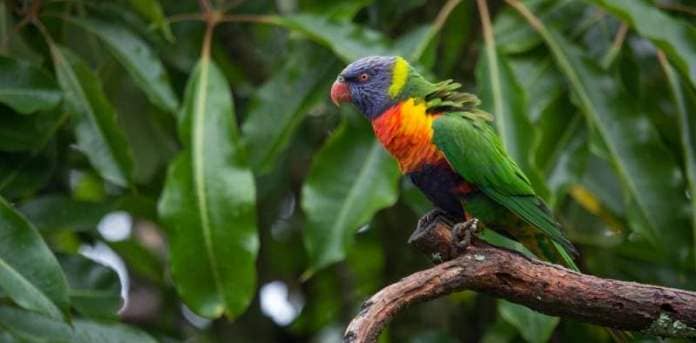by Margaret Stanley, Ellery McNaughton, Josie Galbraith and Rachel Fewster, <a target="_blank" class="article-byline__link" href="https://theconversation.com" rel="noopener">The Conversation</a>
</p><div>

Birds sold in the pet trade are often colorful and charismatic creatures. Some can even be taught to talk, and they often provide owners with much-needed companionship.
<section class="article-banner first-banner ads-336x280">
<!-- /4988204/Phys_Story_InText_Box -->
</section>
But there are negative aspects of the pet trade that warrant a closer look.
Concerns about the billion-dollar global pet industry have usually focused on issues associated with the trade in endangered species, but the industry also plays a critical role in moving invasive species around the globe. For birds, it is the primary source of invasive species.
Our new study highlights how many pet birds, particularly parrot species, are reported as lost by their owners. They are contributing to a consistently large pool of escapees in our suburbs, with the potential to breed and spread.
An ill-fated history of introductions
Unfortunately, Aotearoa New Zealand is famous for its history of deliberate introductions of new bird species through well-organized acclimatization societies. The meticulous record-keeping of these early British settlers has created one of the best global data sets for analyzing the effect of propagule pressure (the number of healthy individuals released) on the establishment and spread of new species.
We now know that propagule pressure is a critical factor in whether a species becomes invasive. It’s a numbers game: the more individuals released (or escaped) and the greater the number of release events (at different times and in different places), the higher the chances a species will successfully breed and eventually spread.
This legacy has left us with a large number of introduced bird species, some of which have negative impacts on native birds.
A new wave of bird imports
Although the days of acclimatization societies releasing new species are long gone, the pet trade has spurred a new wave of companion bird imports. Some of these imports are leading to the escape or even deliberate release of new bird species into the wild.
In 2000, authorities eradicated a population of about 150-200 rainbow lorikeets (Trichoglossus haematodus) in Tāmaki Makaurau Auckland after they were illegally and deliberately released. Sales of this species have continued since, but Auckland became the first and only region to ban sales last year.
Our study investigated the extent to which owners were reporting pet birds as lost through online websites in Aotearoa. What we found was staggering.
During our monitoring period of three-and-a-half years, 1,205 birds and at least 33 species were reported as lost, and 92% of them were parrots. Given that not all owners will list their lost pets on websites, and given that some are released deliberately, these numbers are likely to be a considerable underestimate.
The parrot problem
Globally, parrots have a well-documented history of invasion and impacts.
Ring-necked parakeets (rose-ringed parakeets, Psittacula krameri) have established in 47 countries and form large, noisy populations. They have severe impacts on orchards and crops, and also on native birds by outcompeting them for food and nest sites. About 100 pet owners reported this species as lost in our study.
Worryingly, 23% of the birds reported as lost were part of a group, often with male and female pairs lost together. That makes finding a mate and breeding in the wild much easier.
We used lost-bird data from Auckland in model simulations to investigate the overall propagule pressure from lost pet birds. For seven species (all parrots), we found there was more than an 80% chance of having a male-female pair at large in the same local area at the same time. For the ring-necked parakeet, this figure was a stark 100%, with an average of ten different local areas hosting a male-female pair at any point in time.
Clearly the pet trade poses a major risk for invasion of new parrot species.
Aotearoa has its own unique parrot species, such as kākā, that would be put at risk by these new invaders. Our native birds are already struggling with the onslaught of invasive introduced mammals. While we have tools for controlling mammalian pests, there are currently very few options for controlling invasive birds, and potentially less public support for this.
The only viable and cost-effective approach to preventing the economic and environmental risks invasive parrots pose is prevention. Regional bans will not be enough to prevent spread beyond regions, especially given the ease with which these birds can be bought online from outside the regions with bans. We need to enact regulation at the national level to ban the sale of parrot species that pose the highest risk.
Provided by
The Conversation
<p class="article-main__note mt-4">
This article is republished from <a target="_blank" href="https://theconversation.com" rel="noopener">The Conversation</a> under a Creative Commons license. Read the <a target="_blank" href="https://theconversation.com/escaped-pet-parrots-threaten-new-zealands-vulnerable-native-birds-why-a-ban-is-the-best-solution-197674" rel="noopener">original article</a>.<img src="https://cdn.petnews2day.com/wp-content/uploads/2023/01/Escaped-pet-parrots-threaten-New-Zealands-vulnerable-native-birds—why-a.gif" alt="The Conversation" width="1" height="1"/>
</p>
<!-- print only -->
<div class="d-none d-print-block">
<strong>Citation</strong>:
Escaped pet parrots threaten New Zealand's vulnerable native birds—why a ban may be the best solution (2023, January 25)
retrieved 25 January 2023
from
This document is subject to copyright. Apart from any fair dealing for the purpose of private study or research, no
part may be reproduced without the written permission. The content is provided for information purposes only.
</div>
</div><script id="facebook-jssdk" async="" src="https://connect.facebook.net/en_US/sdk.js"></script>


